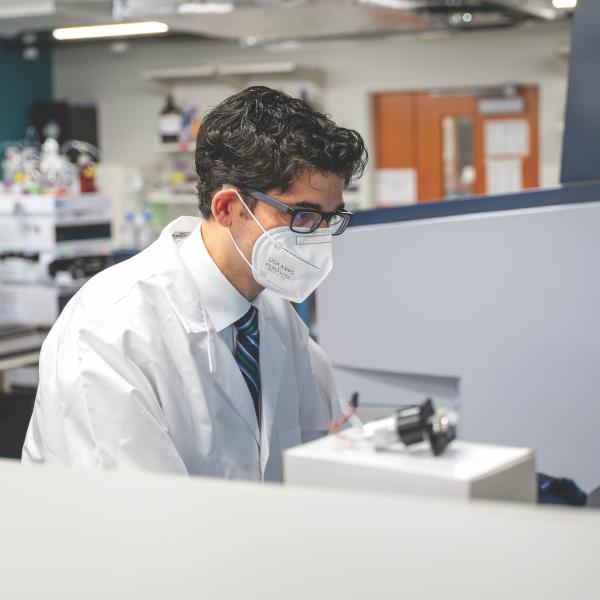This month, researchers in Arts & Sciences received awards from the National Science Foundation, the Packard Foundation, and the National Institutes of Health.
Richard Loomis, professor of chemistry, and collaborator Scott Reid, chair and professor of chemistry at Marquette University, received a three-year $700,000 collaborative grant from the National Science Foundation for their project titled "Probing Undiscovered Reaction Pathways in the Decomposition of Highly-Energized Molecules: Isomerization, Roaming, and Proton-Coupled Electron Transfer." The award also supports training of graduate students, especially outstanding students from diverse backgrounds, who may otherwise be considered high risk. Read more from the Department of Chemistry.
Katharina Lodders, research professor, and Bruce Fegley, professor, both in the Department of Earth and Planetary Sciences, won a $505,505 grant from the National Science Foundation for a project titled "Stellar Chemistry: Abundances and Condensation."
Henric Krawczynski, the Wayman Crow Professor of Physics, received a two-year $459,050 award from NASA to test a novel mini-dilution refrigerator and a SLEDGEHAMMER X-ray microcalorimeter array on a conventional balloon flight. Read more from the Department of Physics.
Calvin Lai, assistant professor in the Department of Psychological & Brain Sciences, won a $349,886 grant from the U.S. Department of Justice's Office of Community Oriented Policing Services (COPS) for a project titled "Encouraging Law Enforcement to Understand Tolerance: National Implementation of the Managing Bias Training Program." Read more from The Source.
Jeffrey Catalano, professor of Earth and planetary sciences, won a $295,464 major research instrumentation grant from the National Science Foundation. The award supports acquisition of a laboratory-based X-ray absorption and emission spectroscopy instrument for primary use by Catalano and collaborators Michael Krawczynski, assistant professor of Earth and planetary sciences; Ryan Ogliore, assistant professor of physics; Arpita Bose, associate professor of biology; and Daniel Giammar, the Walter E. Browne Professor of Environmental Engineering in WashU’s McKelvey School of Engineering.
Bronwen Konecky, assistant professor of Earth and planetary sciences, won a $239,375 award from the National Science Foundation to support collaborative research titled "Quantitative Reconstructions of Last Millennium Hydroclimate and Temperature from the Tropical High Andes." Konecky also received a grant from the David and Lucile Packard Foundation's Diversity, Equity, and Inclusion (DEI) Pilot Fund for a new DEI initiative titled "URG2: Undergraduate Research in the Geosciences for UnderRepresented Groups."
Helina Woldekiros, assistant professor of archaeology in the Department of Anthropology, and her collaborators recently launched the Bibliographic Database of African Scholarship on African Archaeology (BibDAA). The new open-access database collects and shares publications on African archaeology, broadly defined, by African and Afrodescendant scholars. Recognizing that under-citation of Black scholars is a long-standing problem in archaeology and responding to renewed calls to cite Black scholarship, BibDAA supports academic research and teaching by helping scholars and educators discover under-cited work and diversify student reading lists, increasing the visibility of underrepresented researchers. Read more from the Ampersand.
Jonathan Barnes, assistant professor, and Richard Loomis, professor and director of graduate studies, both in the Department of Chemistry in Arts & Sciences at Washington University in St. Louis, recently won a four-year $90,000 grant from the David and Lucile Packard Foundation for the recruitment and retention of underrepresented graduate students in chemistry’s doctoral program. Each year for four years, the Packard award will support three incoming graduate students, with one additional student funded by commitments from Feng Sheng Hu, dean of the faculty of Arts & Sciences, Laurie Maffly-Kipp, interim vice provost of graduate education, and the Department of Chemistry. Read more about chemistry’s efforts to recruit, mentor, support, and train outstanding scientists from diverse backgrounds.
Petra Levin, professor of biology, received an $84,616 equipment supplement from the National Institutes of Health to purchase a new chromatography system. This award supports Levin’s ongoing work on homeostatic control of bacterial growth and cell division.
Glenn Davis Stone, professor of sociocultural anthropology and environmental studies, received a grant to study perceptions of CRISPR in food production. Stone is part of an international team of researchers funded by the European Union to study CRISPR in agriculture and food production. With researchers from Canada, the United Kingdom, Sweden, and Kenya, the interdisciplinary team is looking at how different countries regulate CRISPR technology through policy, how the technology is being used in different places, and public perceptions of these developments. Read more from the Ampersand.
Richard Vierstra, the George and Charmaine Mallinckrodt Professor of Biology, received a $62,707 supplemental grant from the National Institutes of Health for a high-throughput centrifuge and high-performance incubator shaker. The award supports Vierstra’s ongoing project titled "Phytochromes: Structural Perspectives on Photoactivation and Signaling."




